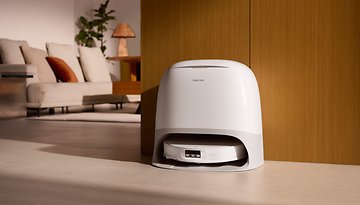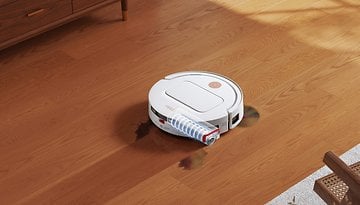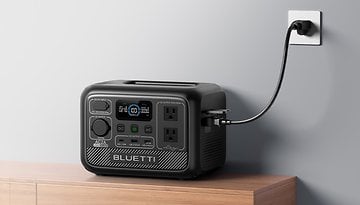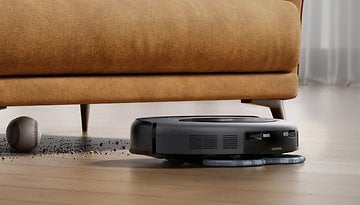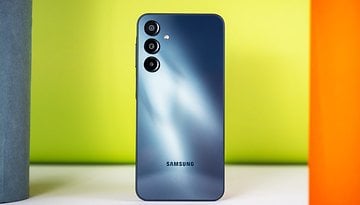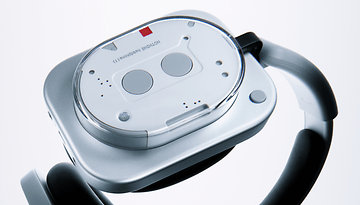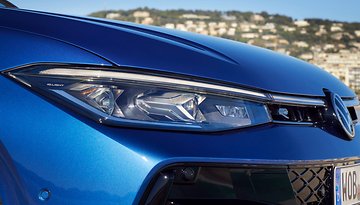70% of smart home predictions since 1988 are now possible
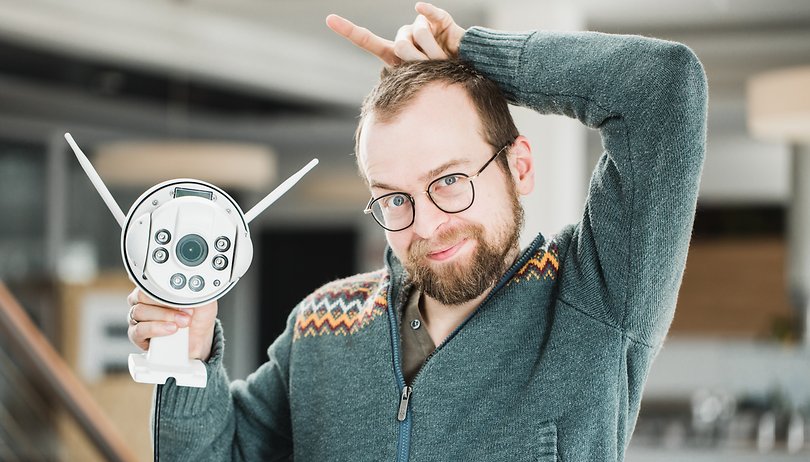

Predicting the future of technology is no easy task. You all will have read articles poking fun at the crazy ideas of experts from the 30s, 40s and 50s, but new research suggests we are getting better at tech foresight. Of 150 smart home predictions made since 1988, 7 out of 10 are possible today, and two-thirds are already in homes.
As a study into smart home hype, Legal & General found that in the last few decades, smart home predictions have taken on a different meaning. The results are fascinating.
The most over-hyped product is the robot vacuum, with 49% of people saying they’re less useful than they expected. Smart tech predictions related to work, such as remote office access and cloud storage, have the highest success rate of becoming a reality.
In total, 73% of the 150 predicted technologies are possible in 2019. Predictions included things like facial recognition technology, social networks and handheld devices. Predictions relating to wellbeing were the least likely to have materialized, with only 40% of those analyzed having done so.
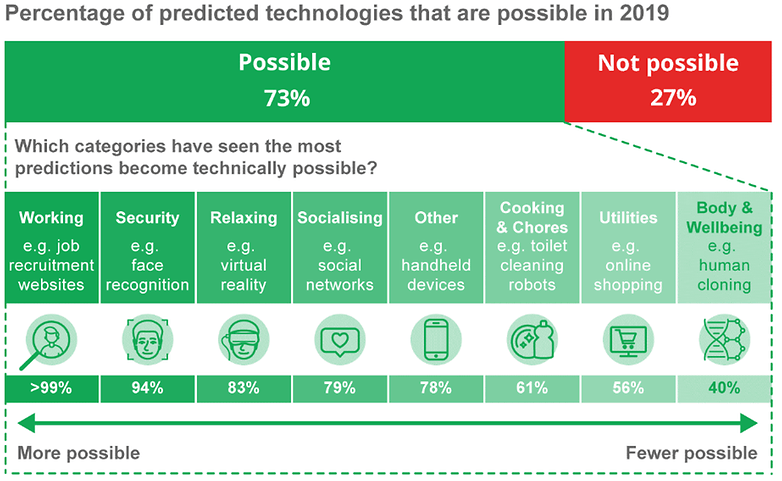
In terms of how many of these smart home predictions are already a reality, 64% are widespread in 2019. The most successful category was utilities, which includes online shopping, whilst the least widespread predictions relate to cooking and chores, including toilet cleaning robots.
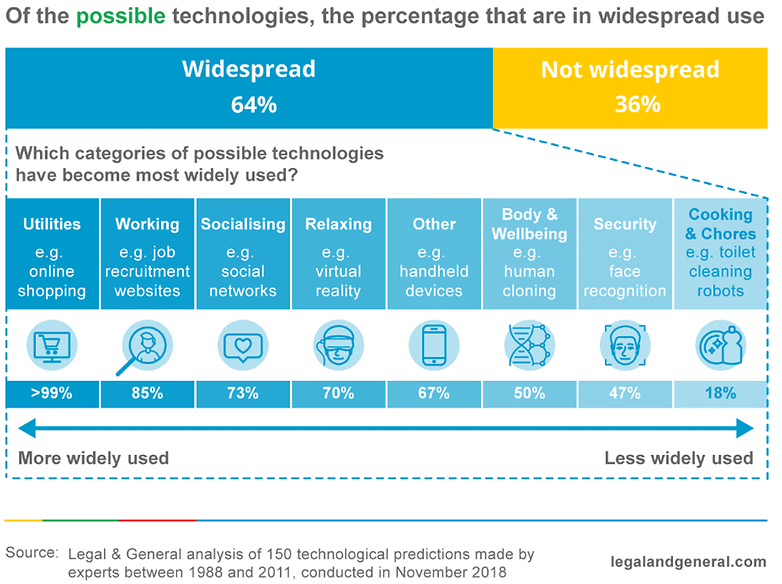
Interestingly, voice assistants didn’t score very well on the ‘more useful than expected’ measure, but over half of buyers (52%) felt they were as useful as they expected. Given that a smart speaker is one of the first smart home devices new customers buy, the data is quite surprising.
Where did the list of smart home predictions come from?
Researchers spent dozens of hours sifting through newspapers, magazines and online articles, looking for forecasts made in the last 30 years. The idea was that originators of these ideas were aware of the internet, microchips and many of the other technologies that have since facilitated the smart home boom.
Sources included books (e.g. Bill Gates’ The Road Ahead), articles from computer and science magazines (e.g. Wired, ComputerWorld, Discover Magazine), the news media (e.g. The BBC, The Guardian, The Wall Street Journal), and industry reports (e.g. FutureLabs, Institute for the Future and BT’s Technology Timeline).
In total, 150 different predictions from over 50 sources made since 1988 were collected. The predictions were then sorted them into eight categories, such as Security (e.g. vibration-activated window sensors), Relaxing (e.g. streamable movies), and Cooking & Chores (e.g. automatic sprinklers and air quality monitors).
1 in 4 of the predictions simply failed to come true at all
A prediction was classed to have failed if it is not yet technically viable or common in our homes of 2019. For example, in 2001 it was predicted that we’d have genuine ‘smelly telly’ which would use small reservoirs of chemicals to recreate aromas. This isn’t possible. In the same year, it was envisioned that by 2008 we’d have solar cells that can convert more than 50% of light into electricity. A decade later and the best cells currently have 21% efficiency.
Certain categories of predictions turned out to be more accurate than others. For example, all of the devices and concepts that were predicted to help us work more effectively are now technically possible, if not totally widespread. For example, digital nomads (predicted in 1988), contactless payments (1995), job recruitment sites (1999), and cloud storage that’s available to all (2007) have all come true.
You can see the full list of 150 predictions, including the outcome of each prediction - whether the technology is widespread, possible or not possible in 2019 - at this link.
What can we take away from all of this?
The study concluded that one reason some smart tech prediction categories have seen more success than others is because certain types of devices, despite having various purposes, are now possible because of one or two fundamental technological innovations. Fast, always-on wireless internet in the home has made many inventions possible, including remote-controlled ovens, streamable TV and films, and sleep monitors.
Legal & General also found that some tech writers over the last 30 years predicted most of the puzzle but missed a key piece. For example, it was thought in 1993 that we’d end up using PCs to control domestic appliances. However, it turned out that PCs themselves would be largely replaced by another device which, at the time, didn’t exist: smartphones.
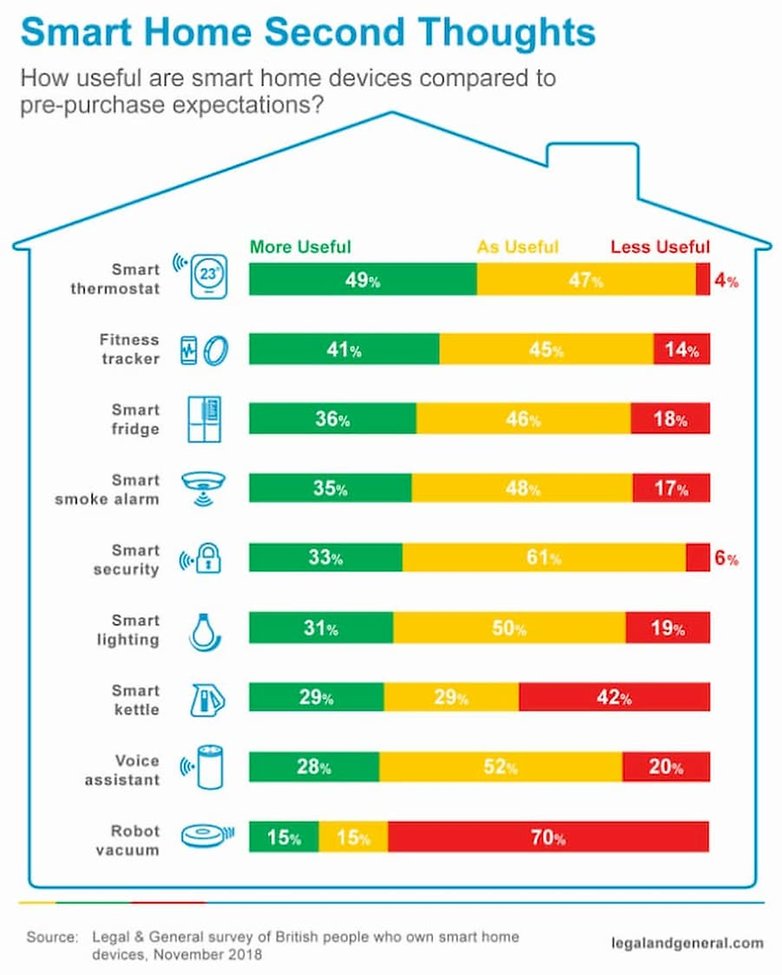
When visions of the future weren’t too outlandish, the predicted arrival dates tended to be quite accurate. In fact, 64% of smart tech predictions that are now possible came true within the predicted time frame.
Other predictions seem to have been all hype. The writers who predicted we’d ‘fax’ 3D objects, embed digital scales under our flooring and sit on toilets that could analyze our fluids to check our health seem to have been simply clutching at straws.
When ‘smart homes’ and ‘smart houses’ started to be mentioned in books in the mid-1990s, writers used the terms to describe a hypothetical living situation in which various home automation devices were present, although it wasn’t always clear how they would be controlled or interact with each other. To see a smart home back then, you’d need to visit a special event or a science exhibition.
Today, it’s no longer whether we can have a smart home, but whether we want one and how smart we’d like them to be.
What about predictions for even further into the future?
As well as collecting 150 predictions from the last 30 years, the researchers selected 10 predictions made in the last five years that have been forecasted to come true by the year 2069 – 50 years in the future. The research team asked 500 people two questions about each one: Do you think it is likely to come true? And would you like it in your life?
The most desirable development, desired by 88% of those asked, is the energy-positive home – houses that generate more power than they use, sending excess back to the grid. In the UK, where the study took place, homeowners can sell energy from solar panels back to the national grid.
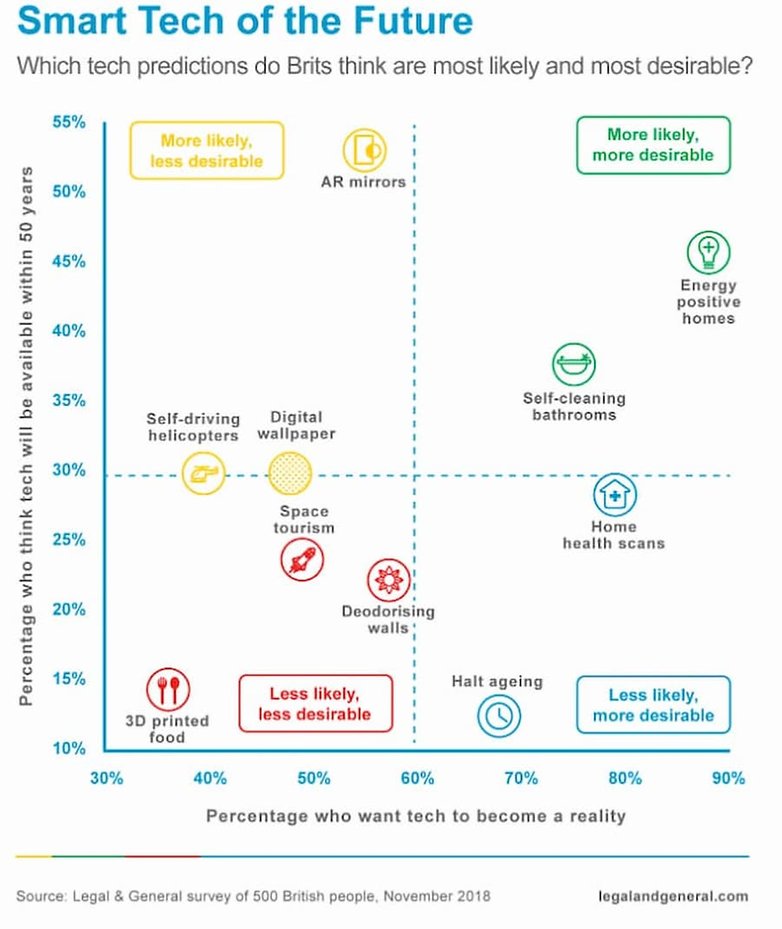
Energy-positive homes were popular across generations too, ranging from 46% of post-millennials (born in 1997 or later) rating them ‘very desirable’ to 62% among millennials (1981-16) and 61% among baby boomers (1946-64). Other concepts were much more divisive. One-quarter of post-millennials loved the idea of printing their own food, as in a scene from Star Trek, compared to 1 in 20 baby boomers.
If you like to read to Legal & General study in full, you can do so at this link.
What do you think about the study? Do you have any predictions of your own for smart homes technology of the future?

